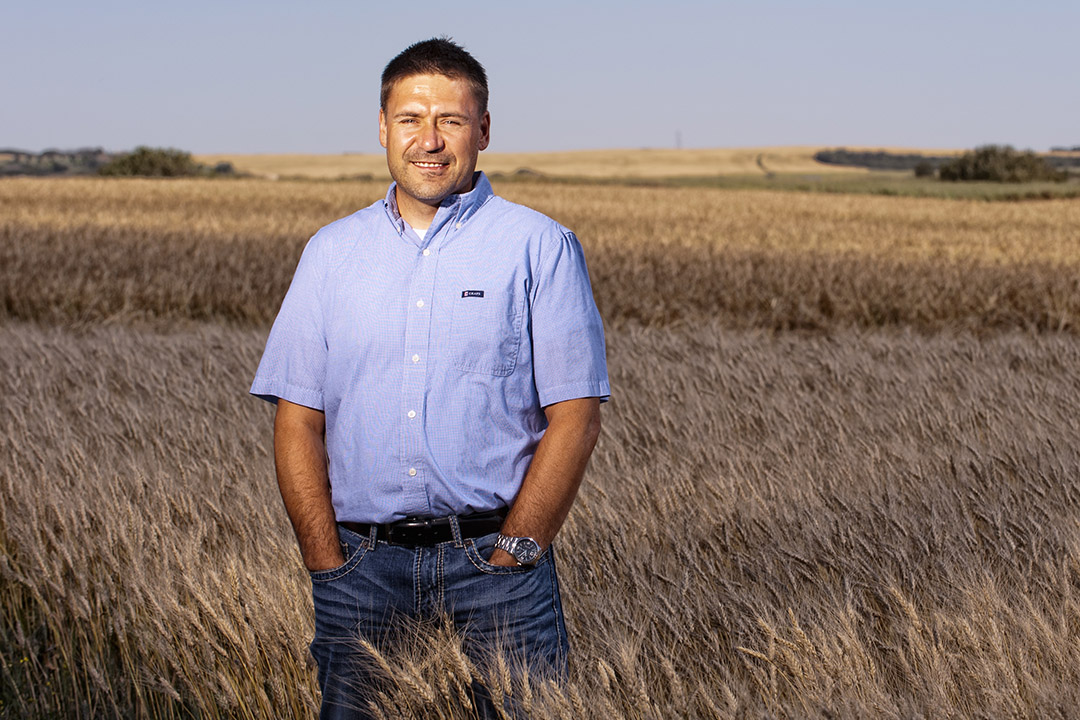
USask-led research teams to improve agriculture through genomic science
Wheat, lentils and livestock will be the focus of a $24.2-million investment over four years by Genome Canada and its partners in three University of Saskatchewan-led research projects aimed at ensuring Canada remains at the cutting-edge of these agricultural markets.
“The agricultural sector is critical to Canada’s economic growth and to improving food security, both at home and abroad,” said USask Vice-President Research Karen Chad.
“Working with our many academic, government and industry partners, this leading-edge genomics research in our rapidly growing biosciences cluster will help crop and livestock producers address key challenges and opportunities, advancing our goal to be the university the world needs.”
More than half the funding—about $13 million—comes from co-funders such as the Saskatchewan government, Agriculture and Agri-Food Canada (AAFC), the Western Grains Research Foundation, Saskatchewan Wheat Development Commission, the Alberta government, Alberta Wheat Commission, Saskatchewan Pulse Growers, USask, and partners in the beef industry.
The three USask-led projects, administered by Genome Prairie, are part of a $76.7-million investment, including partner funding, in eight new projects across the country announced July 23 by Canada’s Science and Sport Minister Kirsty Duncan to advance sustainability and productivity of Canadian agriculture, agri-food and fisheries.
$11.2 million – 4DWheat: Diversity, Discovery, Design and Delivery
In a collaboration between USask and AAFC, USask wheat breeder Curtis Pozniak and AAFC molecular geneticist Sylvie Cloutier will use genomics to improve the breeding and production of wheat, a vitally important crop in global food security.
“Wheat is the most important crop for current and future global food security because it supplies the most calories and protein to the global population,” said Pozniak, who has played a key role in international discoveries to decode the bread wheat and durum wheat genomes.
“Meeting the challenge of increasing wheat production to match the growing demand for food over the next 20 to 30 years is of paramount importance. We will apply cutting-edge genomics to fully access diversity in wheat breeding and to enable new sources of diversity for enhancing yield and managing producer risk to important diseases.”
$7.4 million – Enhancing the Value of Lentil Variation for Ecosystem Survival (EVOLVES)
Building on USask’s renowned history of lentil breeding success, USask plant scientists Kirstin Bett and Bert Vandenberg aim to improve lentil productivity through genomics.
“The industry is seeking to enter the high-value food and ingredients sector and expects future lentil varieties will support this new venture,” said Bett. “We aim to accelerate incorporation of specific quality traits in breeding through strategic use of genetic variability, enabling Canadian producers to rapidly capture emerging market opportunities.”
As the largest lentil producer and exporter in the world, the Canadian economy already benefits from $2.5 billion in export revenue.
“We will contribute to the Canadian pulse industry’s goal of diversifying market outlets and creating price stability,” said Vandenberg. “We also aim to secure Canada as the global leader in all aspects of lentil innovation, and as a preferred supplier of high-quality lentils to the world.”
$5.6 million – Genomic Antimicrobial Stewardship Systems from Evidence-based Treatment Strategies (ASSETS) for Livestock
A multidisciplinary team led by Cheryl Waldner, USask professor of large animal clinical sciences, and Simon Otto, University of Alberta assistant professor of public health and a USask alumnus, will study diagnostic testing for antimicrobial resistance in livestock management, a growing challenge to human and animal health around the world.
This work holds promise to radically accelerate diagnostic testing time for livestock producers and greatly improve the use of antimicrobials (antibiotics) to treat bacterial infections in cattle, swine, poultry and other food animals, said Waldner.
“The idea for this project comes from an increasing need to ensure the safe use of antimicrobials as the world faces the growing global threat of antimicrobial resistance,” Waldner said. “Disease-causing bacteria are increasingly able to resist the antibiotics used to treat them, and the agriculture industry is being called upon to improve antibiotic stewardship in livestock.”
Integrating genomic technology (such as hand-held devices to sequence samples) into diagnostic strategies will revolutionize livestock production, she said. The research team will work closely with beef industry partners, including feedlots and veterinarians, to ensure that the diagnostic testing methods are optimized.
Genome Prairie is also the lead centre for a project awarded $1.1 million over three years from the Genomic Applications Partnership Program, and with co-funder support, the project will total $4.4 million. Led by University of Manitoba scientist Vince Palace, the project at the International Institute for Sustainable Development – Experimental Lakes Area addresses cleaning oil spills in sensitive freshwater ecosystems using non-invasive tools.
“Congratulations to the research teams at the University of Saskatchewan and IISD Experimental Lakes Area for their diligent efforts working with Genome Prairie to develop first-in-class projects,” said Genome Prairie President and CEO Reno Pontarollo. “We look forward to working closely with these researchers to help achieve the best possible benefits for the Prairie provinces, Canada and the world.”

